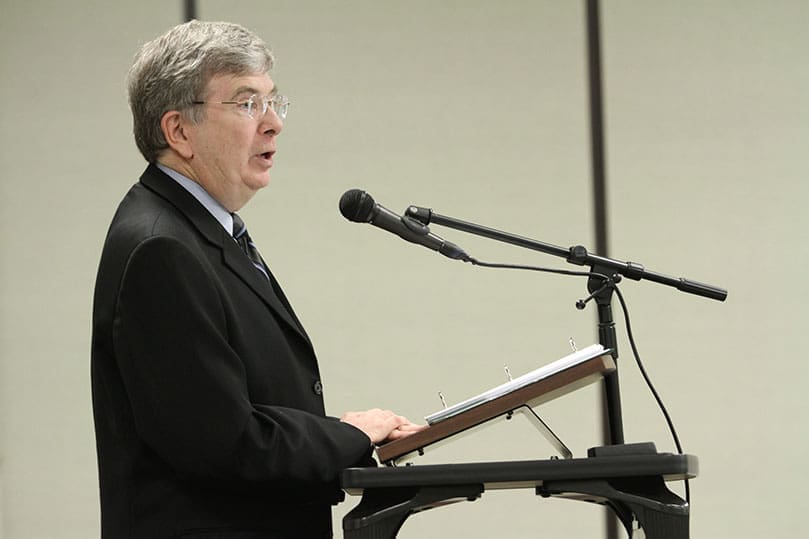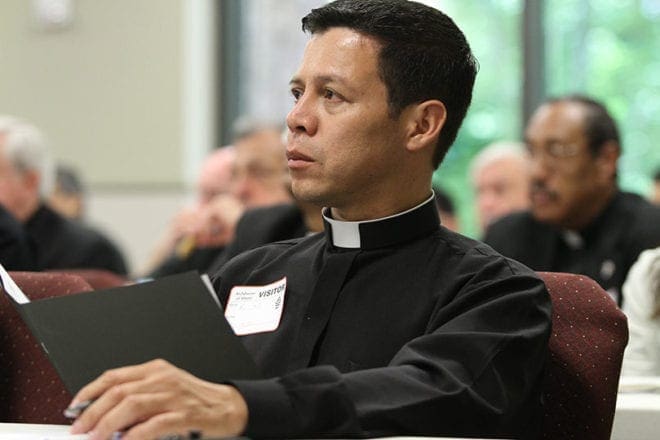 Photo By Michael Alexander
Photo By Michael AlexanderSmyrna
At Meeting, Clergy Given Guidance On Law’s Impact
By GRETCHEN KEISER, Staff Writer | Published May 26, 2011
Priests and deacons attending a meeting May 19 on Georgia’s new Illegal Immigration Reform and Enactment Act were encouraged to continue their pastoral work undeterred.
The clergy were advised not to overly anticipate how the new law will impact their ministries, in part because it may be challenged in court, in part because as a new law it is subject to interpretation, and in part because one section exempts those who give privately funded social services.
“It is certainly the policy of the archdiocese that we follow all state and federal law,” said Frank Mulcahy, an attorney and the executive director of the Georgia Catholic Conference.
However, the law “is new, it is very broad, it is subject to interpretation,” he said. “There is a lot of misinformation out on the Internet and elsewhere. … This is our best assessment of how the law will be interpreted.”
At this time, he said, even lawyers skilled in immigration law are cautious in speculating about which sections may be subject to constitutional challenges and how individuals will be affected by some of the gray areas in the law.
He advised the clergy, “Don’t fall into the trap of giving legal advice.”
He said that if, as expected, the law is challenged, a court may invalidate only parts of it, or place a temporary injunction blocking parts of it, and not void the entire law.
At the same time, the law does not require people to ask about another’s immigration status, Mulcahy said.
If a person comes to the parish for help “you have no obligation to find out what their immigration status is,” he said.
Clergy “are providing a social service,” Mulcahy said. “Don’t back away from that term. I think legislators were trying to carve out for us … a back door way of saying that we are providing the real safety net for society.”
He encouraged the gathering not to let the legislation subtly change their ministry.
“Don’t make any assumptions about anyone you see,” he said.
Auxiliary Bishop Luis Zarama said, “We need to keep with our mission. We don’t need to become afraid. It is a challenge for us how we continue to show our love and our care for our people.”
The priests and deacons were also urged to contact Georgia’s federal delegation and press for comprehensive immigration reform at the national level.
“This needs to be approached on a federal level,” Mulcahy said. “They need to hear from all of us.”
At times, emotional words broke through the section-by-section review of the law.
The Catholic bishops of Georgia opposed the legislation and wrote Gov. Nathan Deal asking him not to sign it into law.
Archbishop Wilton D. Gregory said, “There is no question we are disappointed. … but we are not going to despair.”
“We do not believe this is wise legislation. It is mean-spirited. It is punitive,” he said.
Looking around the room at the clergy and staff members, the archbishop said, “I see people who have a great heart for our people. … We need to walk with them and assure them that we will not abandon them.”
One provision of the law requires, on a phased-in basis over the next 24 months, that employers of 10 or more people use a federal system known as E-Verify to ascertain that newly hired full-time employees are legally able to work in this country.

Colombia, South America native Father Jesus D. Trujillo listens intently during an information session on Georgia House Bill 87. Father Trujillo is the parochial vicar at St. George Church, Newnan. Photo By Michael Alexander
Catholic Charities Atlanta already uses E-Verify, the clergy learned. The archdiocese and parishes do not currently use it.
As it is phased in, it will affect the largest employers first. In determining how many employees a parish, school or organization has, only full-time employees working 35 hours or more a week are counted. Each parish is its own entity. Parish volunteers are not included, Mulcahy said.
Employers with more than 10 employees but fewer than 100 employees would be required to utilize E-Verify on July 1, 2013. Those with over 100 employees but fewer than 500 employees would be required to utilize E-Verify on July 1, 2012. The requirement will be effective on Jan. 1, 2012, for employers with 500 or more employees.
“This will impact parishioners seeking employment and you as pastors and administrators,” Mulcahy said.
Jennifer Bensman, the director of Catholic Charities Atlanta immigration legal services, said the agency has prepared a packet of information that can be given to parishioners concerned about how the new law will affect them and what resources are available to help them investigate their path to legalization.
The Catholic Charities unit did 3,000 new consultations last year for low-income people who had a potential path to remain in the country legally, she said. They also handled 250 cases of juveniles who were in the country alone or were abuse victims and 400 cases of people eligible to stay as crime, sex trafficking or domestic violence victims. They also offered legal orientation services to over 7,500 people in immigration detention.
Currently they have so many cases there is a seven-week wait for a new appointment, she said.
Bensman said the section of the law that creates a new crime of aggravated identity fraud could have a devastating effect on the clients they represent, who have a possible case to remain in the United States legally. If while their case is open, they are charged with using false documents to get a job, their claim is likely to be much harder if not impossible to sustain, she said, because the new law makes this charge such a severe offense.
Bishop Zarama spoke about the differences within the Catholic community over how to address immigration.
“We know we have Catholics who are in favor of this law,” Bishop Zarama said. “Our challenge is how to approach them with charity and try to change their hearts.”
He suggested that one way to speak about it was “trying to awaken the memory of the history of this country.”
Some who are in favor of harsh restrictions on today’s immigrants need to be reminded of the past, he said, “how their ancestors came to this country, how hard they worked and how much they suffered.”
“Everybody has a dream of coming to this country,” said Bishop Zarama, a native of Colombia and naturalized U.S. citizen. “They had a need (then) to escape the situation in their countries. … That is exactly the situation now. … If we use charity and we use history I think we will be able to move more and more people.”